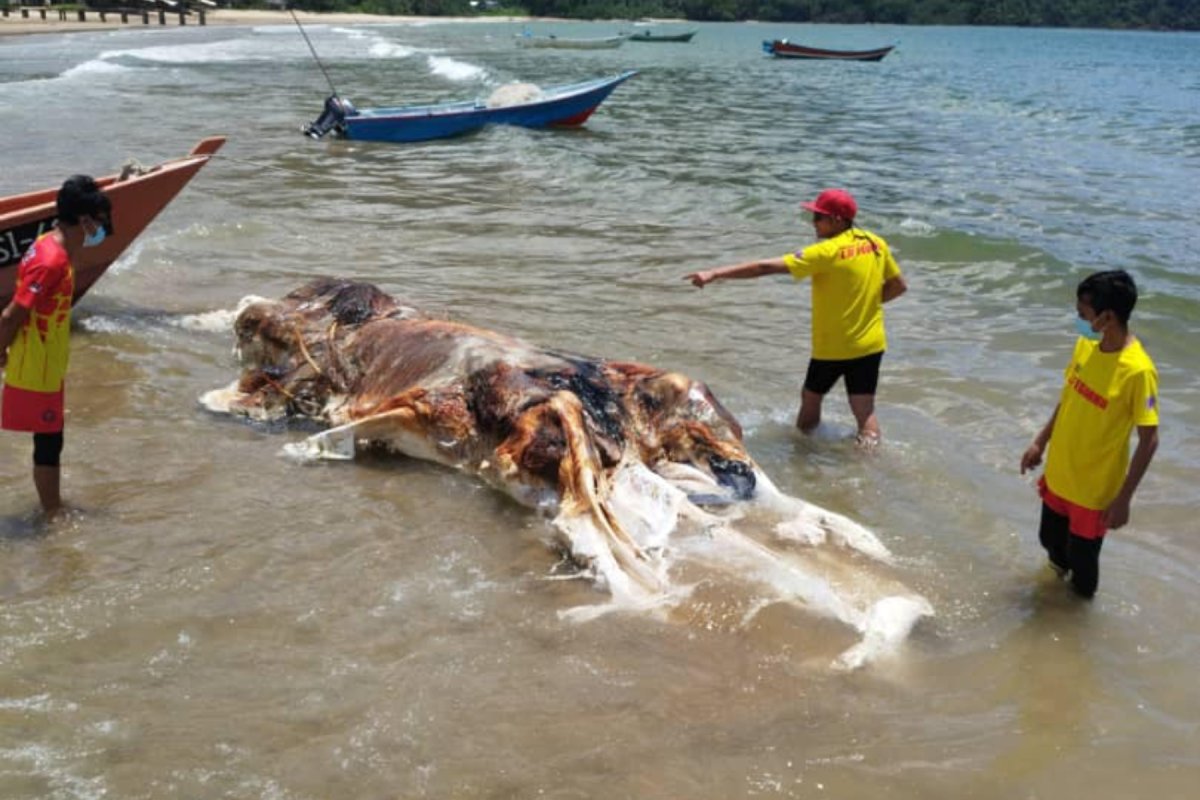A bizarre mass of slimy goop found washed up on a beach in Malaysia is thought to be the decomposing corpse of a whale, according to local authorities.
The discovery was made on Telok Melano Beach in the town of Lundu this past Friday.
The species of whale has not been identified, nor has the cause of its death. Whales may die of natural causes or because of human activities. They can become entangled in fishing gear or collide with ships and boats.
"April 5, 2024, the APM Coastal Rescue Team found the body of a whale stranded on Melano Bay Beach around 12.03 p.m. Members on duty found the body while conducting surveillance around the beach," the Sarawak Civil Defense Force posted to Facebook, sharing pictures of the discovery.
Onlookers crowded to see the strange sight, the New Sarawak Tribune, a local newspaper reported, as whales rarely wash up dead in the region.
When a whale dies at sea, it immediately starts to decompose, with bacteria breaking down its tissues and producing gases, such as methane and hydrogen sulfide, that cause the carcass to bloat and become buoyant.
This bloating can sometimes result in the carcass floating to the ocean's surface, where it may attract scavengers that include sharks, fish, seabirds and crustaceans. These animals feed on the blubber, muscle tissue and organs of the carcass.

Eventually, the whale carcass may become too decomposed or fragmented to remain buoyant, causing it to sink to the ocean floor. But in the case of this unfortunate whale, it appears to have washed up on shore before that happened.
Once the whale carcass reaches the ocean floor, it becomes known as a "whale fall." Over time, the whale's remains are consumed and broken down by numerous organisms, ranging from octopuses, crabs and sleeper sharks to deep-sea polychaete worms and sea cucumbers.
"It's not unusual for dead whales to wash up in various stages of decomposition," Culum Brown, a professor of marine biology at Australia's Macquarie University, told Newsweek.
Dead whales and other sea animals smell extremely bad after they wash up on the shore, as foul-smelling gases like cadaverine and putrescine are produced during the decomposition process.
While whales usually wash up in a more recognizable state, they have been seen in a more decomposed and unidentifiable condition before. In that case, they are often referred to as "globsters." A mystery mass of marine mammal flesh washed up in Papua New Guinea last October, while a hairy-looking glob washed up in Oregon in 2022.
Do you have a tip on a science story that Newsweek should be covering? Do you have a question about whales? Let us know via science@newsweek.com.
Correction 04/08/24 14.13 p.m. ET: This article was updated with a correction to the spelling of Telok
Uncommon Knowledge
Newsweek is committed to challenging conventional wisdom and finding connections in the search for common ground.
Newsweek is committed to challenging conventional wisdom and finding connections in the search for common ground.
About the writer
Jess Thomson is a Newsweek Science Reporter based in London UK. Her focus is reporting on science, technology and healthcare. ... Read more
To read how Newsweek uses AI as a newsroom tool, Click here.






